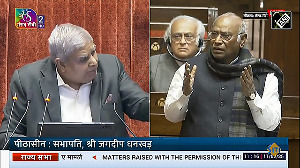The Congress-led United Progressive Alliance government on Thursday committed itself to repeal the controversial Prevention of Terrorism Act, prevent privatisation of profit-making public sector units, go for 33% reservation of seats for women in the Lok Sabha and state assemblies and initiate a national dialogue on job reservation for schedule castes and schedule tribes in the private sector.
These commitments were made in the coalition's Common Minimum Programme, released in New Delhi by Prime Minister Manmohan Singh in the presence of UPA chairperson Sonia Gandhi and leaders of the Congress' allies and supporting parties.
While promising to implement the Places of Worship Act, 1992, the document said the government would await the court verdict on the Ram temple issue but also encourage negotiations between the parties to the dispute.
"The negotiations between the parties to the dispute for an amicable settlement must, in turn, receive legal sanction," the PM said.
There would be no compromise in the fight against terrorism, the document said, but added, "given the abuse of POTA that has taken place, the UPA government will repeal it, while existing laws are enforced strictly."
The document said the government was committed to a strong and effective public sector whose social objectives were met by its commercial functioning
Efforts will be made to be selective in this area and profit- making PSUs "will not be normally privatised", Dr Singh said.
The CMP said the government was "very sensitive" to the issue to affirmative action, including reservations in the private sector. "It will immediately initiate a national dialogue with all political parties, industry and other organisations to see how best the private sector can fulfil the aspirations of scheduled caste and scheduled tribe youth."
Dr Singh said the government would take the lead to introduce legislation for one-third reservation for women in the Lok Sabha and state Assemblies. Legislation on domestic violence and against gender discrimination will also be enacted, he said.
The PM said, "This is a Common Minimum Programme for the UPA government. It is by no means a comprehensive agenda.
"It is a starting point that highlights the main priorities, policies and programmes. The UPA is committed to the implementation of the CMP. This CMP is the foundation for another CMP -- collective maximum performance."
The Congress and its allies and supporting parties approved the CMP after a four-hour debate on Wednesday night.
In her opening remarks at the press conference as the chairperson of UPA coordination committee, Gandhi said that the committee would meet once a month to review the progress of the implementation of the programme.
The CMP, she said, reflected the mandate given by the people of the country for a strong, stable and secular government.
The government, she said, would work and care for all sections of the society especially farmers, youth, women, minorities and weaker sections. "We will implement the CMP in letter and spirit."
Those present at the press conference included Arjun Singh, Pranab Mukherjee and Ambika Soni (all Congress), Harkishan Singh Surjeet (Communist Party of India-Marxist), A B Bardhan (CPI), Raghuvansh Prasad Singh (Rashtriya Janata Dal), Ram Vilas Paswan (Lok Janshakti Party), Vaiko (Marumalarchi Dravida Munnetra Kazhagam), Dayanidhi Maran (DMK), K Chandrasekhar Rao (Telangana Rashtra Samithi), Sharad Pawar (Nationalist Congress Party), Mehbooba Mufti (People's Democratic Party), Sibu Soren (Jharkhand Mukti Morcha), E Ahmed (Indian Union Muslim League), D Biswas (Forward Block) and Abani Roy (Revolutionary Socialist Party).
The Left parties "broadly endorsed" the CMP but said they had "differing positions" on a range of economic issues and were not in favour of the document addressing the question of new states.
On the issue of creation of a separate state of Telangana, the CMP said the government would consider this demand "at an appropriate time after due consultations and consensus".
On Centre-State relations, the document said the government would set up a commission for this purpose "keeping in view the sea changes that have taken place in the polity and economy of India since the establishment of the Sarkaria Commission over two decades ago".
The alliance pledged to respect Article 370 of the Constitution, which provides a special status to Jammu and Kashmir
Dialogue with all groups in J&K will be pursued on a sustained basis, in consultations with the democratically elected state government, it added.






 © 2025
© 2025